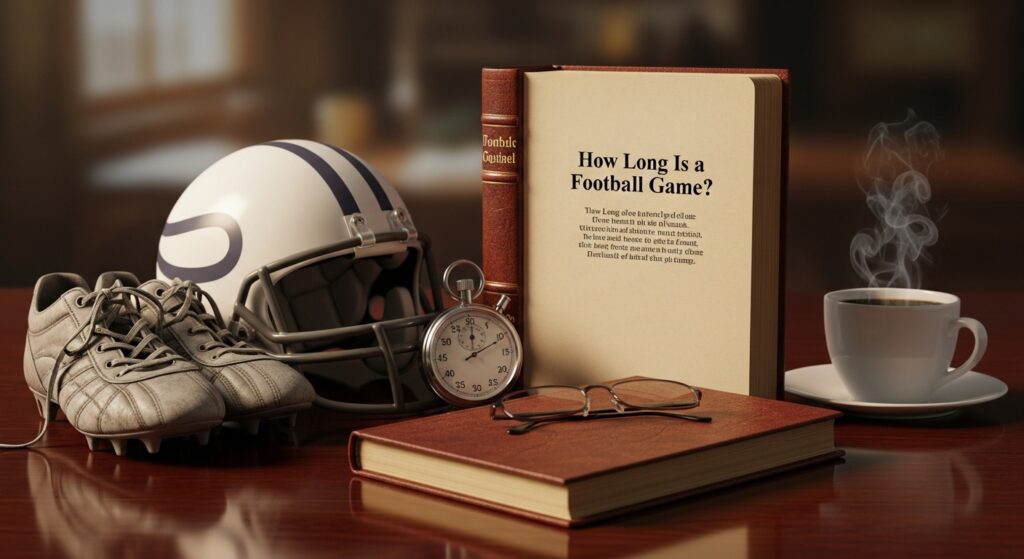In today’s fast-paced world, where every minute counts, fans and newcomers alike often ask a simple question: how long is a football game? At first glance, the answer seems straightforward—60 minutes of play. But anyone who has ever attended a game or watched from home knows the experience stretches far beyond the official clock.
The true length of a football game blends strategy, tradition, and atmosphere. It reflects not just time measured in quarters, but also the moments that bring fans together—halftime shows, instant replays, and emotional pauses that make the sport unforgettable.
This article explores the real length of a football game, the factors that influence it, and why the time spent on and off the field represents far more than numbers on a scoreboard.
The Official Game Clock
Formally, a standard football game is divided into four quarters of 15 minutes each, totaling 60 minutes of play. These quarters are separated by short breaks and a longer halftime intermission.
But unlike continuous sports such as soccer, football’s clock stops frequently—after incomplete passes, timeouts, penalties, and plays that go out of bounds. This means that while the official clock says 60 minutes, the real-world duration often lasts three hours or more.
What Extends the Duration of a Football Game?
Several factors explain why a football game takes much longer than an hour:
-
Stoppages of Play – Referees pause the clock for out-of-bounds plays, incomplete passes, injuries, and reviews.
-
Halftime – Usually around 12–15 minutes in college and professional games, though special events (like the Super Bowl) feature extended shows.
-
Timeouts – Each team has a limited number, and coaches use them strategically, especially in close games.
-
Television Breaks – Broadcast networks schedule commercial breaks that extend real time but fund the sport’s growth.
-
Overtime – If scores are tied at the end of regulation, games can extend significantly, especially in college football where overtime rules differ from the NFL.
Together, these elements explain why anyone asking “how long is a football game” should expect to invest much more than an hour of their time.
College vs. Professional Football Game Length
While both college and NFL games officially last 60 minutes, there are subtle differences in real duration:
-
NFL Games – Average about 3 hours and 12 minutes.
-
College Games – Often run longer, averaging 3 hours and 24 minutes, partly due to different clock stoppage rules (like the clock stopping temporarily after first downs).
These distinctions show how league rules shape not just gameplay, but also fan experience.
The Role of Halftime
Halftime is one of the defining aspects of a football game. More than a break, it is a spectacle and tradition.
-
In the NFL, halftime typically lasts around 12 minutes.
-
In college football, it can stretch to 20 minutes, featuring marching bands, school traditions, and ceremonies.
-
At the Super Bowl, halftime transforms into a cultural phenomenon with performances that last nearly 30 minutes.
Thus, when asking “how long is a football game,” halftime itself becomes an integral part of the answer—it’s not just about playtime but about the culture surrounding the sport.
Television and the Game Clock
Football is as much a broadcast event as it is a stadium one. Commercial breaks—though sometimes frustrating for fans—are critical to the economics of the sport.
-
Networks insert breaks after kickoffs, scoring drives, and turnovers.
-
Instant replays and reviews further extend time but enhance fairness and clarity.
The result is a three-hour experience designed not only for athletes but also for global audiences watching live.
The Fan Experience: Beyond the Clock
When fans ask how long is a football game, the most accurate answer considers the entire matchday journey.
-
Pre-game rituals: Tailgating, warm-ups, and team entrances can last hours.
-
In-stadium atmosphere: Chants, music, and traditions enrich the game beyond the plays.
-
Post-game celebrations or reflections: Fans often linger, celebrating victories or processing defeats.
In reality, a football game is often a day-long event, where the official 60 minutes is only the centerpiece.
Psychological Time vs. Clock Time
Interestingly, the perception of time in football doesn’t always match the actual clock.
-
For fans caught up in the excitement, the hours fly by.
-
For athletes under pressure, even a few seconds can feel like a lifetime.
-
For coaches, strategic pauses stretch moments into defining decisions.
This interplay between measured time and experienced time is part of what makes football unique.
Common Questions About Game Length
-
High School Games: Typically run about 2 to 2.5 hours, with 12-minute quarters.
-
Youth Leagues: Games are shorter, often 90 minutes, adjusted for age groups.
-
Special Events: Games like championships or playoffs may last longer due to ceremonies, trophy presentations, and extended coverage.
Thus, the answer to “how long is a football game” depends on the level of play, the context, and the surrounding activities.
Challenges of Game Duration
While the length of football games adds to the drama, it also poses challenges:
-
Player Fatigue: Longer games increase physical strain.
-
Viewer Commitment: Some casual fans struggle with three-hour broadcasts.
-
Scheduling: Extended durations can disrupt programming or fan travel.
To address this, leagues have explored minor rule adjustments—such as running clocks on certain plays—to balance tradition with efficiency.
Why Game Length Matters
The question “how long is a football game” isn’t just about timing—it’s about what the time represents.
-
Tradition: Preserving rituals that define the sport.
-
Economics: Maximizing fan engagement and broadcast value.
-
Community: Creating shared experiences that extend beyond the clock.
In essence, the length of the game is part of what makes football more than a sport—it’s an event, a ritual, and a unifying force.
Looking Ahead
As technology and fan preferences evolve, the length of football games may continue to be adjusted. Instant replay, digital broadcasts, and fan interactivity all shape how time is managed and experienced.
Still, the essence of the game remains: whether it lasts three hours or more, a football game will always represent a unique blend of strategy, tradition, and excitement.
Conclusion
So, how long is a football game? Officially, it’s 60 minutes of playtime. Realistically, it’s closer to three hours—or more—when you account for stoppages, halftime, and the fan experience.
But beyond the numbers, the true length of a football game lies in its impact. Each second carries the weight of history, emotion, and connection. For players and fans alike, football time is not just measured on the clock—it’s measured in moments, memories, and meaning.






